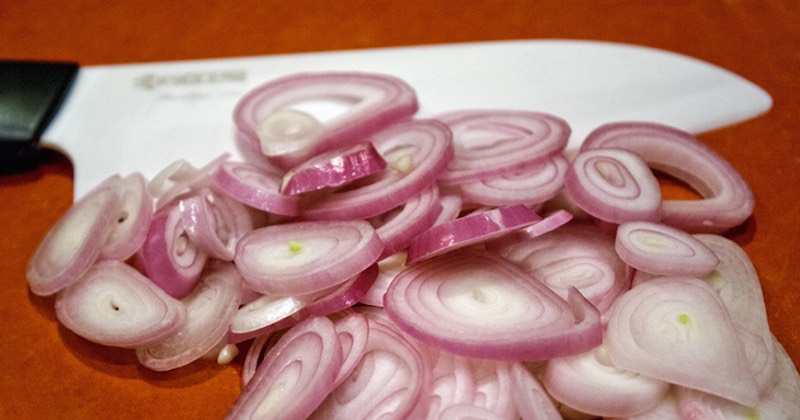Homemade Lacto-Fermented Onions To Balance Stomach Acid, Melt Fats And Improve Brain Functions
Last updated on
Fermentation has been practiced by many cultures for centuries. These processes have been handed down and and passed down, creating family secret foods and national dishes. The most familiar fermented foods are made using lacto-fermentation.
What Is Lacto-Fermentation?
The “lacto” portion of the term refers to a specific species of bacteria, namely Lactobacillus. Various strains of these bacteria are present on the surface of all plants, and are also common for the human’s gastrointestinal tracts, mouths and vaginas.
Lactobacillus bacteria is named such because it was first discovered in milk ferments. These bacteria use lactose or other sugars and convert them into lactic acid. However, lacto-fermentation does not necessarily need to involve dairy products.
Lactic acid is a natural preservative that inhibits the growth of harmful bacteria. Beyond preservation advantages, lacto-fermentation has many other health benefits:
1. Improve Digestion And Enhance Nutrients Absorption
One of the primary benefits of consuming more fermented foods is that the nutrients are much more easily absorbed for healing. They help to improve digestion and heals the digestive tract. By supplying your gut with healthy bacteria, your digestive process is more equipped to destroy or remove harmful bacteria. These bacteria also help your body to absorb nutrients from the food that you are eating.
2. Boost Your Immune System
Your gut is your biggest protection against illness. As such, adding the healthy bacteria found in lacto-fermented foods to your diet can help strengthen your immune system. The spread of healthy bacteria in your gut can help control immune cells and prevent certain autoimmune reactions, such as inflammation.
3. Improve Brain Functions
As with most bodily processes, your brain is connected to your digestive and immune system. For an example of this, think about the last time you were sick with the cold or flu and how fuzzy your head felt. The vagus nerve is responsible for this connection.
The vagus nerve is one of 12 cranial nerves that transfers information from your intestinal nervous system to your central nervous system located in your brain. Maintaining a healthy amount of good bacteria and limiting unhealthy bacteria can keep this line of communication between the two systems open, preventing and improving cognitive issues.
4. Contain Powerful Antioxidants
Lacto-fermented foods contain a variety of powerful antioxidants that can attack free radicals known to cause cancer. These antioxidants can also fight inflammation and strengthen your immune system. This may help you deal with eczema, arthritis, and other conditions that are impacted by inflammation or an autoimmune response.
5. Lose Weight by Eating More Sauerkraut
Lacto-fermented foods help regulate various hormonal functions. This helps you control your food cravings and suppress your appetite. Studies show that people with a high intake of healthy probiotics tend to have a lower risk for obesity.
Related reading: Full health benefits of onion.
DIY Homemade Lacto-Fermented Onions
Like other fermented foods, it is best to make it yourself, so that you know that there are no artificial additives that go into them. When making your own, use natural salt (such as Himalayan pink salt, Celtic sea salt or kosher salt) that are rich in minerals, instead of harmful table salt that is used in commercially-prepared fermented foods.
There are many ways of adding fermented onions in your diet. You can eat it just as it is, add it to sandwiches, to your salads, in your nachos or tacos, and as condiments with your meals.
What You Need
- 1 kilogram (about 2.2 pounds) of small onions or shallots, peeled
- A handful of garlic cloves, peeled
- 50g of natural salt of choice
- 1 liter (about one quart) of pure water without contamination (distilled water is best)
- A few wide mouth glass jars with airtight lids
Spices (Optional):
- Coriander
- Black pepper
- Dried chilli
Instructions
- You can slice the onions or use them whole.
- Prepare the brine: Dissolve 50g of natural salt in one liter (about one quart) of water.
- Place the onions in the jars a little more than half full. Pour the brine over them, leave about 1-2 inches headspace for the fermentation gas.
- Cover the jars with their airtight lids.
- Culture at room temperature (about 60-70oF is best), until desired flavor and texture are achieved. Open the lid daily for the first two weeks, to release the accumulated fermentation gas. After that, every other day.
- Fermentation process can take up to 1 or 2 months to complete. Some people leave it for up to 3 months.
- If your jar, upon opening smells putrid, go with your instinct and throw it out. Start over.
The above is a very easy process, even for a beginner. Once you get the hang of it, you can ferment almost any vegetable.
The brine used in lacto-fermented foods creates an anaerobic, acidic environment. Anaerobic means that there is no oxygen present in the environment. Many lacto-fermented recipes emphasize keeping the food below the level of the brine because the “bad guys” are unable to grow in this environment, while the “good guys” have everything they need.
Lacto-fermentation is safe, easy, healthy and economical. Foods may be kept this way in cool storage for months, providing enzyme-rich foods throughout winter when fresh produce is scarce, yet building up the immune system.
Try to make your own!
Some of the links I post on this site are affiliate links. If you go through them to make a purchase, I will earn a small commission (at no additional cost to you). However, note that I’m recommending these products because of their quality and that I have good experience using them, not because of the commission to be made.
Comments
Leave a Reply











































 JOIN OVER
JOIN OVER
I love this article! Not only do I love fermented / pickle onions – but I love that you also touched on the benefits of lacto bacteria and the benefits it has for the body! Very well rounded article. Thank you for sharing! Can’t wait to try making my own fermented onions at home.
You said to open the lid daily to release the gas. Does that mean to actually take the lid off or just slightly loosen the cap to allow the gases to be released without any are getting into the jar? Also after the week is up you should repeat this process every other day for the entire 2 month fermenting stage?
Thank you,
Lovett
Can you translate the grams and such into American measurements please?